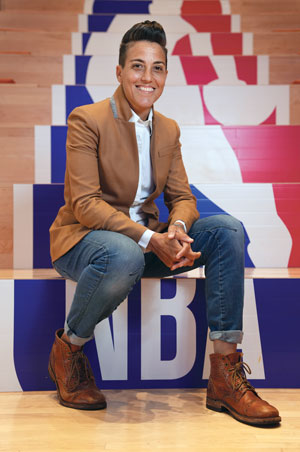Q&A with Jamila Wideman ’03
Before NYU Law, Jamila Wideman ’03 played four seasons of professional basketball in the then brand-new Women’s National Basketball Association (WNBA). After law school, she worked for more than a decade as a public interest lawyer at the Equal Justice Initiative and Legal Aid. Here Wideman explains how she draws on all her career experiences in her current job: senior vice president of player development at the National Basketball Association.
Do you see any common thread in your career?
I think the common thread is that I’m interested in people, and I’m interested in figuring out how to have an impact in the spaces [where] I am in, using the platforms that I have.
My legal career was really focused on, in the first half, criminal defense. And the reality is much of that work was a combination of getting to know people, storytelling, and advocacy. Those three elements are at the core of the job I do now. I get to know the players that I serve. I try to figure out how to tell their stories in a compelling way, and I try to advocate in all kinds of spaces to make sure that there’s room for them to develop and grow.
Both in my role now and having been an athlete, I’m really interested in how [there’s] this massive universe of media and entertainment, where there are billions of dollars to be had by corporate sponsors, leagues, team ownership, advertising revenue. And at the end of the day, you have people on whom that entire industry sits. So in that world, I think [there is] a responsibility to fashion those people as human beings at the same time as we sort of put folks on a pedestal, elevate them as athletes. And be sure that we don’t forget that at the end of the day, they’re people first.
What lessons about competition and leadership carry over from sports to law?
It’s the same magic when you’re working with a group of people and when you’re working with a team. [You’re] balancing what you may begin with in terms of a vision and how you want to get there with actually being able to see the people who are in front of you, who are going to be doing that, and being flexible to adjust to their unique experiences and talents and what they have to offer. And the task then is really about putting people in spaces where what they bring uniquely as human beings can really shine. And that may look really different from how you had initially imagined it.
I think, if anything, that the capacity for listening and a capacity for curiosity and an abiding sense of humility are probably the superpowers that I would say translate across both fields.
You played in the very first seasons of the WNBA, starting with the Los Angeles Sparks. Do you ever wish that you could have experienced the game at its current level of popularity?
My experience was actually of the game being incredibly popular! [I remember] walking around the Los Angeles Forum before the very first game ever tipped and seeing that place completely sold out. Seeing kids in WNBA uniforms with my name on the back.
I feel incredibly grateful to be witnessing this moment. I will say I wish the NIL [“name, image, and likeness” compensation for college athletes] had existed when I was in college, but there is a twin sense of incredible pride, a recognition that the level and the quality of the game that women are playing now is better and improved and just extraordinary to see.
We’ve always thought that the league could grow exponentially if there was a willingness to invest differently. Watching the level of investment in the past, say, five years increase, and how quickly that has translated into just a massive leap in terms of the visibility of the league, there’s also an element of, “We’ve been trying to tell you!” So it’s been incredible to see.
Interview conducted by Emily Rosenthal, former public affairs officer at NYU Law. It has been condensed and edited. Photo: National Basketball Association/Jesse D. Garrabrant
Posted September 10, 2024


